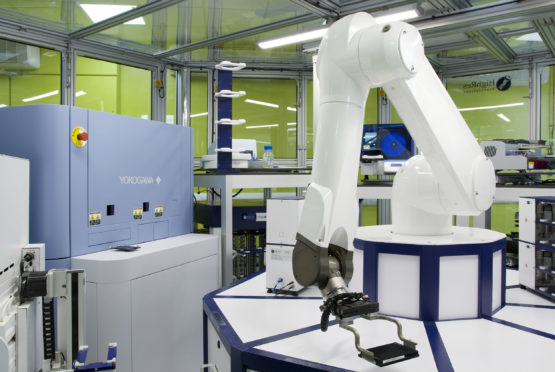Researchers in Dundee have taken a step forward in the hunt for a male contraceptive after developing a robotic screening system to test the effects of drugs and other chemicals on human sperm.
A team of experts at Dundee University, led by Professor Chris Barratt and Dr Paul Andrews, are working towards finding a safe and effective option for men after their latest study was funded by the Bill & Melinda Gates Foundation.
Prof Barratt and Dr Andrews’ study reports the results of a systematic search for chemicals which block sperm motility after screening one of the world’s largest collections of previously approved and clinically-tested drugs, around 13,000 in total.
The outcome of the study shows it is possible to find effective agents which halt the sperm in its tracks, and further work will be done to investigate whether any of these are suitable for long-term use.
Mr Barratt said: “This is a breakthrough in technology for the area. It allows us for the first time to assess in large numbers how compounds can affect sperm function.
“Surprisingly there has been no effective, reversible and widely available form of contraception developed for the male since the condom and, as such, the burden falls largely to the female.
“Finding an effective male contraceptive would be a major step in addressing that inequality.”
Efforts to develop new methods for male contraception have been hampered by the relatively poor understanding of human sperm biology and a lack of studies which convincingly link a protein target in human sperm to its key functions.
The absence of an efficient system to screen the effects of the myriad chemicals and known drugs has also provided a major stumbling block.
Dundee University is uniquely positioned to carry out research on the subject and combined expertise from the School of Medicine, the National Phenotypic Screening Centre (NPSC) and the Drug Discovery Unit to tackle the issue.
The Dundee team developed a miniaturised parallel testing system run by a robot that uses a fast microscope and image-processing tools to precisely track the movement of human sperm, allowing the effects of drugs to be accurately measured.
Dr Andrews, who leads the NPSC, said: “The conventional way to test drugs for contraceptive activity is prohibitively time-consuming.
“Through the hard work of the multi-disciplinary research team in Dundee, we have managed to develop a disruptive technology platform we hope will be a game changer.
“This new system speeds up the process of drug hunting several thousand-fold. The automated system also uses a different method to examine the effects of drugs on a second critical aspect required for fertilisation, called the acrosome reaction.
“This dual platform now allows for major drug discovery programmes that address the critical gap in the contraceptive portfolio as well as uncover novel human sperm biology. “










